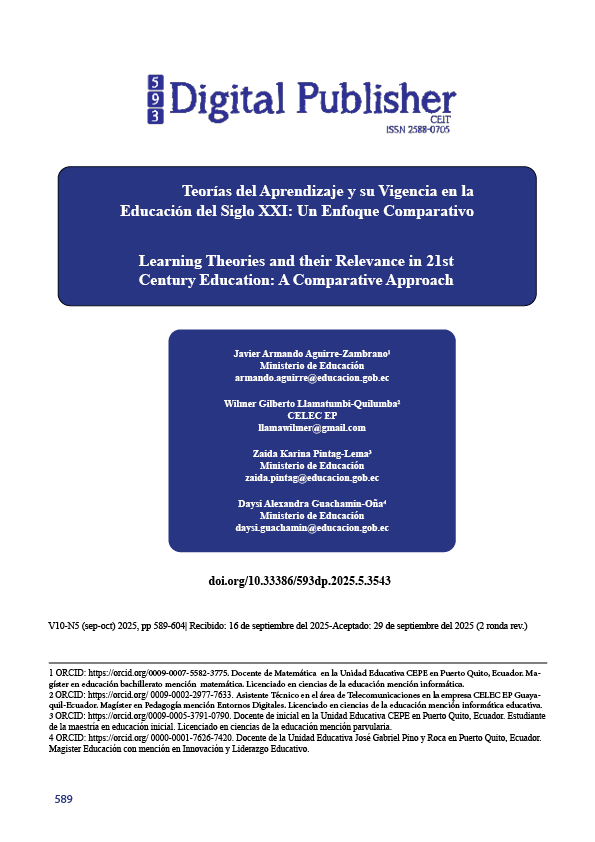Learning Theories and their Relevance in 21st Century Education: A Comparative Approach
Main Article Content
Abstract
In the 21st century, rapid technological, social, and cultural changes pose new educational challenges, demanding a reexamination of classical learning theories in light of contemporary needs. This theoretical article carries out a comparative review of the main learning theories behaviorism, cognitivism, constructivism, humanism, and connectivism evaluating their relevance in today’s education. In the Introduction, the problem is contextualized, highlighting how globalization and the knowledge society require updated pedagogical approaches. In the Development, each theoretical current is analyzed in depth, along with its foundations, contributions, criticisms, and debates, as well as its relevance to educational practices in the 21st century. Conceptual tensions are addressed, such as the dichotomy between direct instruction and discovery learning, the integration of digital technology in learning, and the need for student-centered approaches. It is concluded that all theories provide complementary perspectives, but none is sufficient on its own; therefore, an integrative and contextualized approach is advocated. The limitations of the theoretical study are noted, and future lines of research are proposed, including the adaptation of theories to digital and multicultural educational environments. This work seeks to contribute to the critical discussion on how learning theories can guide educational innovation in Ecuador and around the world, fostering quality education in line with the demands of the 21st century.
Downloads
Article Details

This work is licensed under a Creative Commons Attribution-NonCommercial-ShareAlike 4.0 International License.
1. Derechos de autor
Las obras que se publican en 593 Digital Publisher CEIT están sujetas a los siguientes términos:
1.1. 593 Digital Publisher CEIT, conserva los derechos patrimoniales (copyright) de las obras publicadas, favorece y permite la reutilización de las mismas bajo la licencia Licencia Creative Commons 4.0 de Reconocimiento-NoComercial-CompartirIgual 4.0, por lo cual se pueden copiar, usar, difundir, transmitir y exponer públicamente, siempre que:
1.1.a. Se cite la autoría y fuente original de su publicación (revista, editorial, URL).
1.1.b. No se usen para fines comerciales u onerosos.
1.1.c. Se mencione la existencia y especificaciones de esta licencia de uso.
References
Alberto, P. A., & Troutman, A. C. (2015). Applied behavior analysis for teachers (9na ed.). Upper Saddle River, NJ: Pearson.
Anderson, T. (2016). Theories for learning with emerging technologies. En G. Veletsianos (Ed.), Emergence and innovation in digital learning: Foundations and applications (pp. 35-64). Edmonton: Athabasca University Press.
Anderson, T., & Dron, J. (2011). Three generations of distance education pedagogy. The International Review of Research in Open and Distributed Learning, 12(3), 80-97.
Atkinson, R. C., & Shiffrin, R. M. (1968). Human memory: A proposed system and its control processes. In Psychology of learning and motivation (Vol. 2, pp. 89-195). Academic press.
Ausubel, D. (1968). Educational psychology: A cognitive view. Nueva York: Holt, Rinehart & Winston.
Baddeley, A. (1992). Working memory. Science, 255(5044), 556-559.
Ballesteros Carbajal, A. (2021). Necesidad de un enfoque humanista en el currículo de las ingenierías. En Memorias XVI Congreso Nacional de Investigación Educativa (pp. 1-6). Puebla, México.
Bandura, A. (1977). Social learning theory. Englewood Cliffs, NJ: Prentice Hall.
Bear, G. G. (2015). Preventive and classroom-based strategies. En E. Emmer & E. Sabornie (Eds.), Handbook of classroom management (pp. 15-39). Nueva York: Routledge.
Beckem, J. M., & Watkins, M. (2012). Bringing life to learning: Immersive experiential learning simulations for online and blended courses. Journal of Asynchronous Learning Networks, 16(5), 61-70.
Bell, F. (2011). Connectivism: Its place in theory-informed research and innovation in technology-enabled learning. International Review of Research in Open and Distributed Learning, 12(3), 98-118.
Bender, W. N. (2012). Project-based learning: Differentiating instruction for the 21st century. Thousand Oaks, CA: Corwin Press.
Bokova, I. (2015). Fighting Cultural Cleansing. Harvard International Review, 36(4).
Bruner, J. S. (1960). The process of education. Cambridge, MA: Harvard University Press.
Bruner, J. S. (1961). The act of discovery. Harvard Educational Review, 31(1), 21-32.
Bruner, J. S. (1985). Vygotsky: A historical and conceptual perspective. En J. V. Wertsch (Ed.), Culture, communication, and cognition: Vygotskian perspectives (pp. 21-34). Cambridge: Cambridge University Press.
Brown, J. S., Collins, A., & Duguid, P. (1989). Situated cognition and the culture of learning. Educational Researcher, 18(1), 32-42.
Clark, R. E., Kirschner, P. A., & Sweller, J. (2012). Putting students on the path to learning: The case for fully guided instruction. American Educator, 36(1), 6-11.
Clarà, M., & Barberà, E. (2014). Three problems with the connectivist conception of learning. Journal of Computer Assisted Learning, 30(3), 197-206.
Cobo, C., & Moravec, J. (2011). Aprendizaje invisible: Hacia una nueva ecología de la educación. Barcelona: Universidad de Barcelona / Col·lecció Transmedia XXI.
Deci, E., & Ryan, R. (2000). The “what” and “why” of goal pursuits: Human needs and the self-determination of behavior. Psychological Inquiry, 11(4), 227-268.
Delors, J. et al. (1996). La educación encierra un tesoro. Informe de la UNESCO de la Comisión Internacional sobre la Educación para el Siglo XXI. París: UNESCO.
Downes, S. (2012). Connectivism and connective knowledge: Essays on meaning and learning networks. Creative Commons eBook.
Egan, K. (2002). Getting it wrong from the beginning: Our progressivist inheritance from Herbert Spencer, John Dewey, and Jean Piaget. New Haven: Yale University Press.
Ertmer, P. A., & Newby, T. J. (2013). Behaviorism, cognitivism, constructivism: Comparing critical features from an instructional design perspective (Reprint from 1993). Performance Improvement Quarterly, 26(2), 43-71.
Eyre, D. (2016). High performance learning: How to become a world class school. Londres: Routledge.
Fernández, O., Luquez, P., & Leal, E. (2010). Procesos socio-afectivos asociados al aprendizaje. TELOS, Revista de Estudios Interdisciplinarios en Ciencias Sociales, 12(1), 63-78.
Freire, P. (1970). Pedagogía del oprimido. Montevideo: Tierra Nueva.
Freire, P. (1997). Pedagogy of the heart. Nueva York: Continuum.
García, O. F., & Ochoa, G. M. (2019). Empatía y neuroeducación: la clave para un aprendizaje significativo. Revista Complutense de Educación, 30(2), 535-550.
Goleman, D. (1995). Emotional intelligence. Nueva York: Bantam Books.
González Beade, I. (2023). El conductismo en la formación docente: una mirada crítica. Revista Iberoamericana de Investigación en Educación, (7), 63-72. https://doi.org/10.58663/riied.vi7.95
Guerrero, C. (2019). Creencias docentes sobre teorías de aprendizaje en profesores de educación básica. Revista Colombiana de Educación, 76, 319-342.
Hmelo-Silver, C. E., Duncan, R. G., & Chinn, C. A. (2007). Scaffolding and achievement in problem-based and inquiry learning: A response to Kirschner, Sweller, and Clark. Educational Psychologist, 42(2), 99-107.
Holmes, W., Bialik, M., & Fadel, C. (2019). Artificial intelligence in education: Promises and implications for teaching and learning. Boston: Center for Curriculum Redesign.
Jonassen, D. H. (1991). Objectivism vs. constructivism: Do we need a new philosophical paradigm? Educational Technology Research and Development, 39(3), 5-14.
Kirschner, P. A., Sweller, J., & Clark, R. E. (2006). Why minimal guidance during instruction does not work: An analysis of the failure of constructivist, discovery, problem-based, experiential, and inquiry-based learning. Educational Psychologist, 41(2), 75-86.
Kop, R. (2011). The challenges to connectivist learning on open online networks: Learning experiences during a massive open online course. International Review of Research in Open and Distributed Learning, 12(3), 19-38.
Kop, R., & Hill, A. (2008). Connectivism: Learning theory of the future or vestige of the past? International Review of Research in Open and Distance Learning, 9(3), 1-13.
Kropf, D. C. (2013). Connectivism: 21st century’s new learning theory. European Journal of Open, Distance and E-Learning, 16(2), 13-24.
Lave, J., & Wenger, E. (1991). Situated learning: Legitimate peripheral participation. Cambridge: Cambridge University Press.
Landers, R. N. (2014). Developing a theory of gamified learning: Linking serious games and gamification of learning. Simulation & Gaming, 45(6), 752-768.
Limongi Izaguirre, M. C. (2017). Métodos conductistas en la escuela del siglo XXI. [Documento de tesis de grado, Universidad de Especialidades Espíritu Santo, Ecuador]. Repositorio UEES.
Lozano, J. F. (2019). Educación intercultural y teorías de aprendizaje: una revisión crítica desde Abya Yala. Revista Latinoamericana de Educación Intercultural, 3(1), 45-60.
Mackness, J., & Bell, F. (2015). Rhizo14: A rhizomatic learning cMOOC in sunlight and in shade. Open Praxis, 7(1), 25-38.
Maritain, J. (1943). Education at the crossroads. New Haven: Yale University Press. (Ed. esp. La educación en tiempos críticos).
Martínez, G. A. (2017). Educación a la luz del Humanismo Cristiano. Frater, Revista de Estudios Aplicados, 1, 11-17.
Maslow, A. (1970). Motivation and personality (2da ed.). Nueva York: Harper & Row.
Maslow, A. (1972). El hombre autorrealizado. Barcelona: Kairós.
Mattar, J. (2018). Constructivism and connectivism in education technology: Active, situated, authentic, experiential, and anchored learning. RIED. Revista Iberoamericana de Educación a Distancia, 21(2), 201-217. https://doi.org/10.5944/ried.21.2.20055
Mayer, R. E. (2004). Should there be a three-strikes rule against pure discovery learning? The case for guided methods of instruction. American Psychologist, 59(1), 14-19.
Mayer, R. E. (2020). Multimedia learning (3ra ed.). Cambridge: Cambridge University Press.
Meller, P. (2018). Claves para la educación del futuro: Creatividad y pensamiento crítico. Barcelona: Plataforma Editorial.
Ministerio de Educación del Ecuador. (2016). Currículo de Educación General Básica y Bachillerato 2016. Quito: Subsecretaría de Fundamentos Educativos.
Miralbell, I. (2023). Aportes de la filosofía y la psicología humanista para la educación en el ser. Revista de Filosofía UCSC, 22(2), 95-112. https://doi.org/10.21703/2735-6353.2023.22.2.2102
Montessori, M. (1967). The absorbent mind. Nueva York: Holt, Rinehart & Winston.
NASEM National Academies of Sciences, Engineering, and Medicine. (2018). How People Learn II: Learners, contexts, and cultures. Washington, DC: National Academies Press.
OECD Organisation for Economic Co-operation and Development. (2018). The future of education and skills: Education 2030. Paris: OECD Publishing.
Phillips, D. C. (1995). The good, the bad, and the ugly: The many faces of constructivism. Educational Researcher, 24(7), 5-12.
Piaget, J. (1970). La equilibración de las estructuras cognitivas. Buenos Aires: Siglo XXI.
Pozo, J. I. (2014). Aprendices y maestros: La psicología cognitiva del aprendizaje. Madrid: Alianza Editorial.
Prince, M., & Felder, R. (2006). Inductive teaching and learning methods: Definitions, comparisons, and research bases. Journal of Engineering Education, 95(2), 123-138.
Reeves, T. C., Herrington, J., & Oliver, R. (2002). Authentic activities and online learning. En Proceedings of HERDSA 2002: Quality Conversations (pp. 562-567). Perth, Australia.
Richelle, M. (2011). ¿Qué ha sido del conductismo en el siglo XXI? Anuario de Psicología, 42(3), 545-556. (Trad. del francés).
Rogers, C. (1961). On becoming a person. Boston: Houghton Mifflin. (Trad. esp. El proceso de convertirse en persona).
Rogers, C. (1969). Freedom to learn. Columbus, OH: Merrill. (Trad. esp. Libertad y creatividad en la educación).
Rubio Gaviria, D. A., & Jiménez Guevara, J. E. (2021). Constructivismo y tecnologías en educación: entre la innovación y el aprender a aprender. Historia de la Educación Latinoamericana, 23(36), 61-92. https://doi.org/10.19053/01227238.12854
Schunk, D. H. (2012). Learning theories: An educational perspective (6ta ed.). Boston: Pearson.
Scott, C. L. (2015). The futures of learning 3: What kind of pedagogies for the 21st century? (ERF Working Papers Series, No. 15). París: UNESCO.
Siemens, G. (2004). Connectivism: A theory for the digital age. elearnspace. Recuperado de http://www.elearnspace.org/Articles/connectivism.htm
Siemens, G. (2005). Connectivism: Learning as network-creation. ASTD Learning News, 10(1).
Siemens, G. (2008). Learning and knowing in networks: Changing roles for educators and designers. ITFORUM, Paper 105. University of Georgia.
Siemens, G. (2011). Moving beyond self-directed learning: Network-directed learning. Connectivism blog. Recuperado de http://www.connectivism.ca/?p=307
Siemens, G. (2012). MOOCs are really a platform. elearnspace blog. Recuperado de http://www.elearnspace.org/blog/2012/07/25/moocs-are-really-a-platform/
Siemens, G., & Long, P. (2011). Penetrating the fog: Analytics in learning and education. EDUCAUSE Review, 46(5), 30-32.
Skinner, B. F. (1954). The science of learning and the art of teaching. Harvard Educational Review, 24(2), 86-97.
Skinner, B. F. (1971). Beyond freedom and dignity. Nueva York: Alfred A. Knopf.
Sweller, J., van Merriënboer, J., & Paas, F. (2019). Cognitive architecture and instructional design: 20 years later. Educational Psychology Review, 31(2), 261-292.
Tokuhama-Espinosa, T. (2019). Neuromyths: Debunking false ideas about the brain. Nueva York: W. W. Norton.
UNESCO. (2015). Rethinking education: Towards a global common good? París: UNESCO Publishing.
UNESCO. (2021). Reimaginar juntos nuestros futuros: Un nuevo contrato social para la educación. París: UNESCO.
von Glasersfeld, E. (1995). Radical constructivism: A way of knowing and learning. Londres: Falmer Press.
Vygotsky, L. S. (1978). Mind in society: The development of higher psychological processes. Cambridge, MA: Harvard University Press.
Watson, J. B. (1913). Psychology as the behaviorist views it. Psychological Review, 20(2), 158-177.
Zawacki-Richter, O., et al. (2019). Systematic review of research on artificial intelligence applications in higher education where are the educators? International Journal of Educational Technology in Higher Education, 16(39), 1-27.





